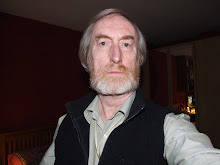Moving to a new place always makes me feel a bit down. I have to find somewhere to stay, hoping there's going to be an amenable bar close-by, where I can have a bit of chat. I don't know a single soul, there are just so many things to go wrong.
Then I get up, have a good breakfast, find the historical society library, get introduced to the index, and in no time at all I'm sitting in peace and quiet with something interesting to do. And I feel really, really good. I think I'm becoming addicted to historical societies.
The Historical Society of Delaware Research Library is housed in an old bank on Wilmington's Market Street. It used to be the Artisan's Savings Bank. When I say "old", it opened in 1930. I don't know how long it's been closed. But it's an art-deco gem. In fact, this whole section of Market street looks like some architect arrived in 1929 obsessed with what became art-deco, and somehow persuaded them to tear the whole place down and let him rebuild it.
My thesis here is that, since the Missouri Glasgows came from here, it's possible that this might be named for the same family. That's going to be tougher to prove than I hoped. Glasgow is in the Pencader Hundred (that's how they divided up counties) in what was originally known as the "Welsh Tract". So perhaps it's "Glas-cu", "dear green place" in what was British, and is now called Welsh. And it seems to have started its colonial life as Aikentown, after the innkeeper, Matthew Aiken, who laid it out. The will of Wm Thompson, in 1784, described some propery as "adjoining Aikentown. Another, in 1803, describes property as "adjoining the Village of Glasgow, where I now live". Matthew Aiken, in 1791, bought a "lot of ground known as Aiken Tavern" from one James Stewart.
The 1787 property tax list for Christiana Hundred, next door, lists the estate of James Glasgow. The James Glasgow after whom Glasgow Missouri was named was born in Christiana in 1784. His mother was Eleanor Aiken Stuart. Is there a family connection?
Somewhere between 1784 and 1803, the name changed from Aikentown to Glasgow. Question is: when, and why?
Later that night I got into conversation with a man who had lost his 90k job, and now had one at 45k, working shifts. He was quite cheerful about it. 45k is still quite good, and he hadn't lost his house. He seemed a bit like Robert the Bruce's spider: he was just going to pick himself up and start climbing again. I was full of admiration. But I didn't ask him if he could fix motor cars, in case he tried to borrow money from me.




No comments:
Post a Comment